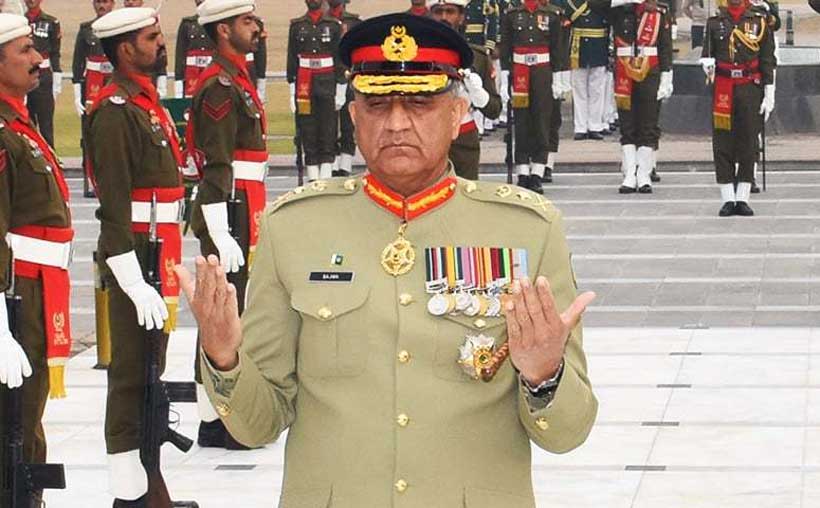“Beware the naked man who offers you his shirt” is an old African proverb that aptly sums up Pakistan Army chief Gen Qamar Javed Bajwa’s announcement that his army is prepared to “go to any extent” to help Kashmiris. In any democracy, for the army chief to make such a politically charged statement would be something unheard of, but then, Pakistan has its own unique democratic setup in which everything appears to be hunky-dory–provided that you really believe the repetitive announcements made by their Politicians and Generals that they are “on the same page’!
In armies all over the world, making promises that can’t be kept is considered an unsoldierly act and so, promising to “go to any extent” is an ‘open ended’ assurance that not many army men would dare to give. But to be fair to Gen Bajwa, he isn’t the first Pakistan Army chief to have done so and neither will he be the last. Yet, in contrast to his predecessors who took care to avoid any direct mention of Pakistan Army’s support to the proxy war in Kashmir, Gen Bajwa seems to get so emotional that while speaking about Kashmir, he invariably gives such incredible assurances that at times he sounds more like a politician rather than an army chief.
But why does the Pakistan Army have such a fatal obsession with Kashmir?
Well, whereas the Pakistan Army defends its Kashmir fixation by terming it the “unfinished agenda” of partition, the reality is quite different. The fact of the matter is that it has unsuccessfully tried to militarily ‘resolve’ this so called “unfinished agenda,” not once but twice. It did so in 1947 by concealing deployment of its regular forces by passing them off as tribals and repeated the same ploy in 1965 by disguising its soldiers as ‘razakars’ (civilian volunteers). Since both these attempts failed miserably, it is but natural that for an army that has bestowed superhuman military prowess upon itself, Kashmir constantly reminds Rawalpindi of its own failings and weakness.
By abrogating Article 370 and declaring that it’s India’s internal matter, New Delhi has made it clear to the world that it has absolute authority over Kashmir. This move has fully exposed the falsity of Islamabad’s claim of Kashmir being a “disputed territory” and Rawalpindi’s assertion of it being the “unfinished agenda” of partition. Since Pakistan has twice failed to get control of Kashmir, one wonders what exactly Gen Bajwa means when he says that the Pakistan Army is prepared to go to “any extent” for the sake of Kashmiris. That’s the reason why this assurance of Gen Bajwa has a striking similarity to the case of a naked man offering his shirt!
Some say that frustration could be the reason behind Gen Bajwa’s announcement. Though this does appear to be plausible, but Gen Bajwa doesn’t seem to be the kind of person who would indulge in empty rhetoric. Nor is he as swashbuckling as Gen Ayub Khan who started the Indo-Pak conflict in 1965 to annex Kashmir, or whimsical like Gen Yahya Khan who declared war against India in 1971 with great flourish and ended up losing East Pakistan; lastly, he’s most certainly not as foolhardy as Gen Musharraf who embarrassed Pakistan by his 1999 Kargil misadventure. That’s why even though Gen Bajwa’s assurances may sound farfetched, they can’t be brushed aside as the grumbling of a sore loser.
Let’s not forget that it was the Pakistan Army and its Inter-Services Intelligence (ISI) that during Gen Zia-ul-Haq’s rule brought terrorism to J&K by training local youth and equipping them with weapons. But right from the beginning, it was abundantly clear that Gen Zia and his Generals were never under any delusions that the ‘mujahideen’ that they had created would be able to achieve ‘azadi’ (independence) by defeating Indian security forces. On the contrary, Gen Zia formed these ‘mujahideen’ only to offset the numerical disparity between the conventional forces of India and Pakistan and his plan was simple–Terrorists would remain elusive and employ hit-and-run tactics, thereby tying down a large number of Indian troops for security duties and anti-terrorism operations.
Furthermore, as this plan didn’t involve use of Pakistan Army personnel, the proxy war in Kashmir couldn’t be directly linked to Islamabad and since the terrorists were Kashmiris, Pakistan would be under no obligation to provide financial support or look after the families of those terrorists killed in gunfights with security forces. In short, this being a ‘low cost’ option “to bleed India through a thousand cuts,” was too lucrative to ignore. That terrorism in Kashmir is being patronised by Rawalpindi solely for the purposes of suiting its own vested interests has even been accepted by none other than Hizbul Mujahideen chief Syed Salahuddin, who also heads Pakistan-based ‘United Jihad Council’ when he said that his cadres were actually “fighting Pakistan’s war in Kashmir”!
Tailpiece- Since Pakistan Army lacks the capability to wrest Kashmir by force, the only logical interpretation of Gen Bajwa’s promise of going to “any extent” is that regardless of the consequences, the Pakistan Army is prepared to escalate violence levels along the Line of Control and terrorist activities in the hinterland. But how exactly will all this help the people of Kashmir is a million-dollar question, which neither Gen Bajwa nor his Inter Services Public Relations spin-master Maj Gen Asif Ghafoor will ever care to answer.
A humble suggestion for my Kashmiri brothers and sisters– while they say that it’s not good to look the gift horse in the mouth, but when a naked man offers you his shirt, then one needs to be very-very careful!

